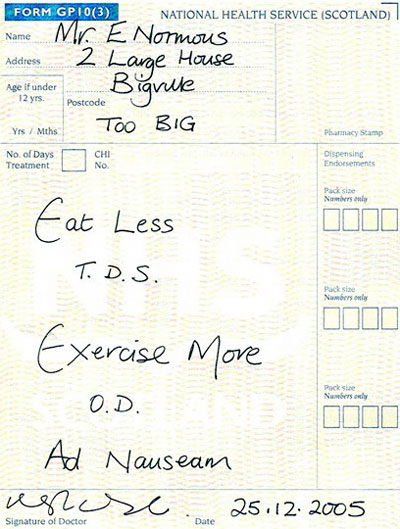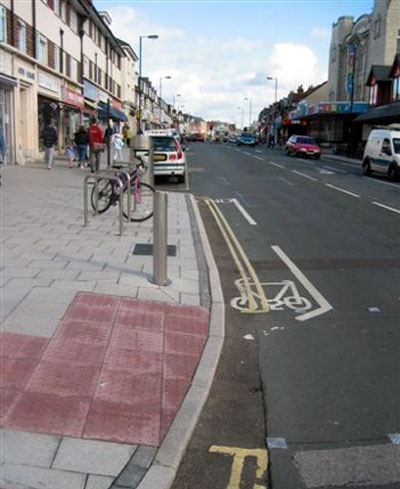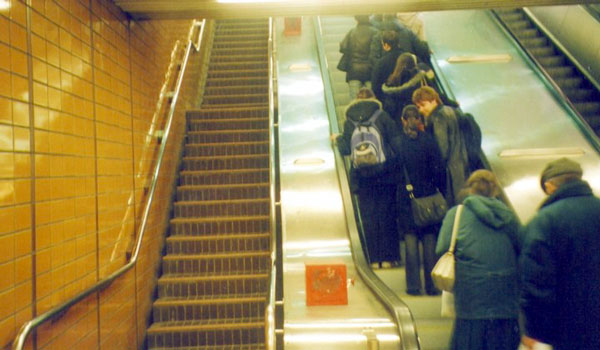David Ogilvie and Neil Hamlet
December 2005
First published: British Medical Journal 2005; 331: 1545-1548
The year is 2055. Socrates is discussing the history of the western obesity epidemic with Panacea, the goddess of healing.
Socrates: Do you recall the days when people were still allowed to smoke?
Panacea: Indeed, Socrates. It seems unthinkable now. Of course, in those days, smoking was the leading preventable cause of chronic disease. It is remarkable how times have changed.
Socrates: In the last fifty years, obesity has come to account for more health problems than any other single factor. I can't help thinking, Panacea, that something could have been done to prevent this. What on earth was going on at the beginning of the 21st century?
Panacea: Well, it was common knowledge that more and more people were becoming overweight. Obesity was well established as a risk factor for all kinds of diseases. There was even talk of epidemics and time-bombs. [1, 2]
Socrates: So why were people becoming obese?
The rational prescription
Panacea: Surely that's obvious. They were consuming more energy than they were expending.
Socrates: It was that simple?
Panacea: Absolutely.
Socrates: I suppose this was a recent scientific discovery?
Panacea: Oh no, Socrates. Even in the 20th century, the concept was well understood. [3]
Socrates: Is the human body not designed to regulate itself?
Panacea: Indeed. It has sophisticated mechanisms for controlling hunger and appetite.
Socrates: So why did some people not achieve a balance between their energy inputs and energy outputs?
Panacea: Well, Socrates, it was all to do with their lifestyle choices. [4]
Socrates: Some followed a lifestyle of gluttony?
Panacea: Or a lifestyle of sloth. Or both.
Socrates: Your explanation implies a very neat, rational prescription, Panacea. If people consume more energy than they expend, they will gain weight, and if they are told to adjust their intake to suit their needs, they won't gain weight.

Panacea: Indeed, Socrates.
Socrates: Didn't your disciples take this message to the people?
Panacea: Oh yes! They offered all manner of diets, drugs, operations, healthy living campaigns... One could hardly avoid being exposed to the information.
Socrates: These measures helped people to lose weight?
Panacea: Sort of. Well, some of them, anyway. [5]
Socrates: Presumably, then, the weight of the population as a whole went down?
Panacea: No, Socrates. The weight of the population as a whole went up. [1]
Socrates: People ignored all the diets, then?
Panacea: No, Socrates. Many people tried many diets.
Socrates: I see. So much for controlling energy intake. Can we also assume that people were expending too little energy?
Panacea: Conceivably, Socrates. The television demanded many hours of attention each day. The more advanced citizens even managed to watch TV while simultaneously eating high-energy snacks to support their cerebral activity. [6]
Socrates: Couldn't people have chosen to do other things in their leisure time?
Panacea: They were very busy with their computers and TVs. They didn't have much time or inclination for activities like walking. [7]
Socrates: To recap, then, if people consume more energy than they expend, they will gain weight, and if they are told to adjust their intake to suit their needs, they won't gain weight?
Panacea: It didn't seem to work like that, Socrates.
Beyond the rational prescription: the obesogenic environment
Socrates: So, Panacea, your rational prescription is found wanting. Tell me, what do the scientists tell us about human instincts?
Panacea: That human beings are inclined to conserve energy wherever possible. [8]
Socrates: What sort of environment would suit that kind of organism?
Panacea: One where food was scarce, and people had to use large amounts of energy hunting and gathering.
Socrates: And where were people hunting and gathering at the turn of the 21st century?
Panacea: In places where food was abundant and they could get hold of it with little effort — especially if they could find a convenient parking space.
Socrates: An environment designed to encourage energy intake and discourage energy expenditure?
Panacea: Indeed, Socrates. Some of my disciples began to describe it as an obesogenic environment. [9]
Socrates: Intriguing. How did they respond?
Panacea: Surely that's obvious. They did what they were trained to do: they described it, measured it, investigated it, published their findings...
Socrates: Yes?
Panacea: Well, then they said it should be modified.
Socrates: What was the idea behind modifying the obesogenic environment?
Panacea: To increase the availability of healthier choices, of course. [4]
Socrates: So you're now saying that people are exposed to a set of hazards which you call the obesogenic environment, and if that environment is modified to increase the availability of healthier choices, then people will adopt a more appropriate energy balance?
Panacea: Yes, Socrates.
Socrates: Was anything actually done to modify the environment?
Panacea: Oh yes! Cycle lanes were painted on the roads.

© Bruce Ogilvie
Socrates: Presumably there was a huge increase in cycling after road space was reallocated so effectively?
Panacea: Sadly not. But other things were done too. Soft drinks companies were banned from putting their brand names on vending machines in schools. [10]
Socrates: Soft drinks were banned from schools?
Panacea: No, Socrates, you must have misheard me. If children demanded soft drinks, companies had the right to supply them. It was only fair.
Socrates: So, these changes to the obesogenic environment... they were quite ambitious?
Panacea: Well...
Socrates: They sound more like tinkering to me. Let us recap again, Panacea. People are exposed to a set of hazards which you call the obesogenic environment, and if that environment is modified to increase the availability of healthier choices, then people will adopt a more appropriate energy balance. It's that simple?
Panacea: Well, perhaps with the benefit of hindsight, it wasn't quite that simple.
Beyond the obesogenic environment: the obesogenic society
Socrates: So, Panacea, your environmental modifications are also found wanting. I can't help wondering why people didn't design an environment which would enable them to achieve a more appropriate energy balance.
Panacea: A splendid idea, Socrates.
Socrates: So, this obesogenic environment — who designed it?
Panacea: I'm not sure that anyone deliberately designed it. It just happened.
Socrates: Spontaneously?
Panacea: No, Socrates.
Socrates: Very well. Where did it come from, then?
Panacea: I suppose the people made it, Socrates.
Socrates: By accident?
Panacea: Yes, I suppose so.
Socrates: Tell me, Panacea, why do people eat?
Panacea: Well, people need food to provide fuel for their activities. And some people see eating as an important social activity.
Socrates: So why were people being "accidentally" exposed to so much fuel?
Panacea: Because the producers were paid to make too much, and the food companies had to sell the food to someone. [11] [12]
Socrates: These food companies — presumably their aim was to provide food of the highest nutritional quality to the people?
Panacea: I suppose so.
Socrates: You sound unsure. Had they some other aim?
Panacea: I believe there may also have been a profit motive.
Socrates: Ah yes — you refer, of course, to the heady days of consumer capitalism?
Panacea: Indeed, Socrates. Everything had become a commodity.
Socrates: What was the primary objective of society at that time?
Panacea: To be honest, Socrates, it sometimes seemed as if the primary objective of society was for people to keep buying things. [13]
Socrates: This was in people's best interests?
Panacea: Oh yes! People loved shopping.
Socrates: And some found they could profit from everyone's love of buying things?
Panacea: Indeed! Everyone knew that the pursuit of economic growth was the key to success, prosperity, happiness, health...
Socrates: Presumably there was evidence to this effect?
Panacea: Ah... [14] Well, money was very important, Socrates.
Socrates: So the people had made unconstrained economic growth their highest priority?
Panacea: Indeed. No government could get elected on any other platform.
Socrates: I see. Was it possible to sell other things to the people?
Panacea: Oh yes! Exercise, for example.
Socrates: So the ways of using up energy had also become commodified?
Panacea: Indeed, Socrates. There were tremendous business opportunities in health clubs.
Socrates: I don't understand. Why couldn't people take exercise by walking or cycling to work, or playing in the park?
Panacea: They were too busy earning money to pay for all the things they were told they wanted to buy — and worn out from driving in heavy traffic to get to work. In any case, how could anyone make a profit out of such mundane activities?
Socrates: Bicycle manufacturers, perhaps?
Panacea: True, Socrates. But the more the people used cars, the more they were told that cycling was dangerous. [15]
Socrates: So it was better that people should drive to their health club and pay for their exercise there?
Panacea: Indeed. Or better still that they should just pay their membership fees and not actually turn up. They didn't really have time.
Socrates: I suppose everyone benefited from this consumerist society?
Panacea: Absolutely. Everyone had more choice, and of course, if the range of available choices is increased, then obviously...

Socrates: ... People will take the healthier choices?
Panacea: Well, if choices aren't offered, how can people choose a healthy option?
Socrates: You don't think offering all this choice might have encouraged people to eat too much? [16]
Panacea: Well, I think people wanted to make up their own minds.
Socrates: That might have been reasonable so long as people could afford to go and exercise the "right" choice.
Panacea: Ah. Well, it's true that it was easier to buy healthy food in some places than others... [17]
Socrates: And perhaps it might also have been easier to exercise safely if one had the right money or the right address?
Panacea: Conceivably, Socrates. [18]
Socrates: I see. Correct me if I'm wrong, Panacea, but your disciples treated the obesogenic environment as a hazard imposed on the population from outside, and tried to tinker with it. But actually that environment was the inevitable result of a much more fundamental problem: society had chosen to prioritise the wrong values in life?
Panacea: Yes, Socrates, I believe that is so.
Conclusion
Socrates: So, Panacea, let us summarise what we have learned about western society at the beginning of the 21st century. It was a society with an abundant food supply...
Panacea: In which people were actively encouraged to eat too much...
Socrates: In the pursuit of economic goals...
Panacea: And in which simple physical activity like cycling was seen as positively dangerous...
Socrates: And if people did want to resist these forces, it helped to have money to pay for safe exercise and nutritious food...
Panacea: Yes, Socrates, that about sums it up.
Socrates: A society that had got its priorities out of order?
Panacea: An obesogenic society.
Socrates: Well then, Panacea, your disciples in those days were fond of phrases like "primary prevention" and "going upstream". Did they never come up with a serious challenge to the obesogenic society?
Summary
To date, our approach to obesity has largely been based on a simple individualistic prescription to balance energy intake against energy expenditure.
This approach works for some of the people, some of the time, but is clearly not working at population level.
Recognising the importance of the obesogenic environment was a crucial step forward in understanding the causes of, and potential solutions to, the emerging obesity epidemic.
However, our current "environmental" responses to obesity amount to little more than marginal changes, and ignore the fact that the obesogenic environment is itself the product of the way we have chosen to organise our society.
The only realistic prospect of reversing the growth in obesity lies in a decision to adopt a different set of societal priorities.
This article is an abridged version of an original dialogue jointly written and illustrated by the authors and performed at public health events in Scotland and northern England in 2004 and 2005. The dialogue was written to stimulate further debate about the conclusions of a community of inquiry into the causes of obesity in Scotland, originally published at www.obesescotland.org.uk and subsequently in abridged form in Public Health News (15 November 2004). The members of the community of inquiry were Karen Budewig, Fiona Crawford, Neil Hamlet, Phil Hanlon, Jill Muirie and David Ogilvie, who all contributed equally to the thinking which inspired this article.
References
1. Obesity: preventing and managing the global epidemic. Report of a WHO consultation. World Health Organisation Technical Report Series 2000; 894: 1-253.
2. Storing up problems: the medical case for a slimmer nation. London: Royal College of Physicians of London, Royal College of Paediatrics & Child Health and Faculty of Public Health, 2004.
3. Egger G, Swinburn B. An "ecological" approach to the obesity pandemic. British Medical Journal 1997; 315: 477-80.
4. Department of Health. Choosing health: making healthier choices easier. London: Stationery Office, 2004.
5. Asp N-G, Björntorp P, Britton M, Carlsson P, Kjellström T, Marcus C, et al. Obesity — problems and interventions. Stockholm: Statens beredning för medicinsk utvärdering (The Swedish Council on Technology Assessment in Health Care), 2002.
6. Ebbeling C, Pawlak D, Ludwig D. Childhood obesity: public-health crisis, common sense cure. Lancet 2002; 360: 473-82.
7. Department for Transport. Transport Statistics Bulletin: National Travel Survey 2002. London: Stationery Office, 2004.
8. Peters J, Wyatt H, Donahoo W, Hill J. From instinct to intellect: the challenge of maintaining healthy weight in the modern world. Obesity Reviews 2002; 3: 69-74.
9. Swinburn B, Egger G. The runaway weight gain train: too many accelerators, not enough brakes. British Medical Journal 2004; 329: 736-9.
10. Day J. Scottish schools ban food adverts. The Guardian 2003; 24 December.
11. Neroth P. Fat of the land. Lancet 2004; 364: 651-3.
12. Diet, nutrition and the prevention of chronic diseases. Report of a joint WHO/FAO expert consultation. Geneva: World Health Organisation, 2003.
13. Cable News Network. Transcript of President Bush's address to a joint session of Congress on Thursday night, September 20, 2001. (accessed 27 January 2004).
14. Hamilton C. Growth fetish. London: Pluto, 2004.
15. Department for Transport. It's no joke. (accessed 10 June 2005).
16. Lean M. Prognosis in obesity. British Medical Journal 2005; 330: 1339-40.
17. Ellaway A, Macintyre S. "5-a-day" may be harder to achieve in more deprived areas. J Epidemiol Community Health 2004; 58: 892.
18. Ellaway A, Macintyre S. Play areas for children. J Epidemiol Community Health 2003; 57: 315.
Text © David Ogilvie and Neil Hamlet (2005). The right to reproduce this article is exclusively licensed to the BMJ Publishing Group.
www.healthyfuture.org.uk
